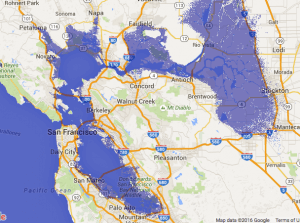7th Graders Become UN Climate Negotiators for a Day
By
Shanna Edberg
March 31, 2016
 San Fransisco under 2 meters of sea level rise
San Fransisco under 2 meters of sea level rise
Guest blog by Ginger Wallis, a teacher in New Hampshire who ran the World Climate mock-UN negotiations simulation for her seventh-grade students. Below are her reflections on the exercise.
The kids learned so much, and in such a fun way. Students really got:
- the sense that every country has to contribute
- each country has their own concerns and needs and ways they can contribute
- the social justice aspect
- sea level rise impacts countries and people along coastlines of many different countries
- we need to stop increasing emissions in a short amount of time
- deforestation and afforestation policies matter
Their feedback afterwards was very positive and they totally think I should continue doing this with seventh grade students in the future. They felt the impact of:
- Having to sit on the floor or at a table with tablecloth, water, etc., and felt that was an important piece
- They commented on how they felt like they really were delegates from their country/countries and were trying to do the best they could for their country and the world
- They liked having a fossil fuel representative come and make it more realistic and bring in that aspect.
After the exercise, the students were instructed to write down their reactions to their experience participating in the negotiations. Following are one student’s answers to some of the debrief questions.
What changed in your thinking?
I didn’t realize how many people would be affected by global warming. Parts of most of the developing countries will be underwater if global warming doesn’t stop. The map of the world that showed what countries might be under water if the water rises, was very interesting and I really enjoyed looking at that.
How did you feel when the summit was over on Friday?
I felt accomplished, we found a way to stop global warming and to save millions of people before all the presidents did. I also felt a bit sad, because what we did in three days, still hasn’t worked out in the real world and if it continues, we will be in big trouble.
What surprised you?
I was very surprised at how much of a difference we could make by saying we would drop our CO2 amounts by 0.5 every year. Every little thing made a difference.
What do you think were the most important insights from this experience about the issues that various parts of the world face regarding climate meetings and climate change?
It is really hard to decide on things that every country agrees on. This isn’t a problem that only one country has to deal with. Everyone has to work together to accomplish the goal.
What do you think were the most important insights from this experience about the climate system including temperature, sea level rise, and ocean pH?
I thought that it was very interesting to be able to see what parts of countries would be under water. I also realized that we have to do something about climate change before it is too late. If we don’t get our temperature down soon, the whole world will be impacted
What do you think were the most important insights from this experience about the negotiations that are required to make a world agreement?
The world climate meetings are very important because it helps everyone realize what they need to accomplish. In our meeting, everyone saw where we had to get, and we accomplished our goal by everyone pitching in and working together to get where we need to be.
This was the first time that your teacher led this activity. Should the seventh grade teachers do it in the future? Why or why not?
This unit was very interesting and I really enjoyed debating and making deals with other countries. I didn’t know much about climate change before this and I think that the seventh grade curriculum should definitely include this unit.

